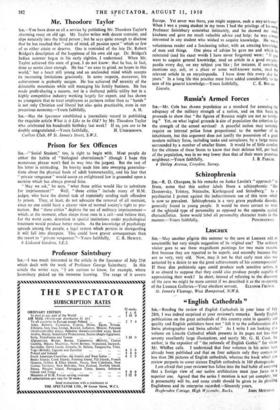Mr. Theodore Taylor
SIB.—You have done us all a service by publishing Mr. Theodore Taylor's charming essay on old age. Mr. Taylor writes with decent restraint, and slips naturally into the third person ; but he says quite enough to disclose that he has reached. that " calm of mind, all passion spent " which so few of us either attain or deserve. One is reminded of the late Dr. Robert Bridges's description of the happiness of his own old age. Dr. Bridges's Indian summer began in his early eighties, I understand. When Mr. Taylor achieved this state of grace, I do not know: that he has, in fact, done so seems clear enough. He has " no axes to grind, no hopes in this world," but a heart still young and an unclouded mind which accepts its increasing limitations graciously. In some respects, moreover, his achievement is probably unique. He has achieved the serenity, of the delectable mountains while still managing his family business. He has made profit-sharing a success, not in a sheltered public utility but in a highly competitive industry working largely for export, and has shown us youngsters that to treat employees as partners rather than as " hands " is not only Christian and liberal but also quite practicable, even in our
precarious economy.—Yours faithfully, A. H.


































 Previous page
Previous page